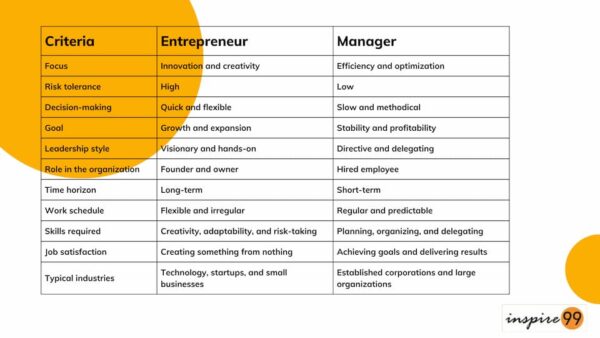The world of entrepreneurs, leadership and management gets blurry. In this article, we talk about some of the differences between manager and entrepreneur. For context, an entrepreneur is someone who takes risks and starts a business. A manager is someone in a corporate setup or an established company responsible for specific targets and outcomes. At times, an entrepreneur behaves as a manager. There are other times when a manager is supposed to behave like an entrepreneur. However, both these scenarios call for a specific mandate. Let’s explore more while unpicking the differences Between Manager and Entrepreneur.
In a normal setup, a manager works in an area of certainty, whereas an entrepreneur works in areas of uncertainty. An entrepreneurial lifestyle calls for a higher level of decision-making, risk-taking and facing the outcomes of risk The results of entrepreneurship are often personal. Whereas, as a manager. It’s easier to separate between a job and your personal life. The main point to understand is that they perform in very different environments. The same skills will not help you survive or thrive in the other field. The key components of this article are:
Table of Contents
Differences Between Manager and Entrepreneur
For two things to be identified differently, there must be certain similarities. A manager and an entrepreneur share a lot of similarities. They both depend on the performance of a team, achieving a few goals at a specific timeline and ensuring the best use of the resources. The differences between manager and entrepreneur are in slighter nuances. These nuances are in areas of risks, the need of leadership, showcasing the vision and the autonomy to take decisions.

A manager’s ability is challenged in these areas because their mandate is much smaller compared to our entrepreneur. An entrepreneur is a personal driver of the idea, its vision and its future. The entrepreneur must see more than a few steps into the future. Should be willing to take gambles and ensure that the overall responsibility is on their shoulders in a typical managerial setup. It’s often hierarchy where responsibility setting is passed on between different leaders and people. As we read further. We’ll start uncovering these types of Differences Between Manager and Entrepreneur.
Entrepreneur vs Manager, table of differences
We talk about specific areas of difference, such as roles and responsibilities, innovation, long-term vision, adaptability and flexibility, etc, the roles and responsibilities of a manager are primarily around operations, best use of resources, managing budgets and ensuring that there is predictability in operation. However, the role of an entrepreneur demands more. It operates in the areas of uncertainty, where a risk is required, they are expected to set the vision and drive The team with less knowledge of the future. They take over action responsibility for not only the organisation’s survival but also everyone involved within the organisation.
| Aspect | Manager | Entrepreneur |
|---|---|---|
| Roles and Responsibilities | Oversees operations, focuses on execution, resource allocation, and stability | Identifies opportunities, creates innovations, takes risks, and establishes new ventures |
| Risk and Decision-Making | Minimizes risk, follows established protocols | Embraces risk, makes decisions under uncertainty |
| Innovation and Creativity | Optimizes processes, enhances efficiency | Driven by innovation, seeks disruption and uniqueness |
| Long-Term Vision | Contributes to the organization’s vision through short-term goals | Pursues a long-term vision, focuses on the bigger picture |
| Adaptability and Flexibility | Adapts to maintain stability | Adapts to navigate ambiguity and change |
| Creating vs. Sustaining | Ensures continuity and incremental growth | Creates new ventures, seeks growth, might move on to new projects |
| Mindset and Attitude | Operational and structured | Risk-taking and visionary |
| Collaboration vs. Authority | Collaborates with authority within organizational structures | Collaborates, leverages networks and partnerships |
| Contribution to Business | Provides a foundation for efficient execution | Drives growth, brings fresh ideas, shapes innovation |
Roles and Responsibilities
A manager’s role focuses mainly on overseeing the operations, execution and management of existing resources. The role primarily focuses on efficiency, ensuring that we get the maximum output. It also relies on best utilisation of the budget and provide predictability for the business. The main requirement from this role is to ensure that there are no surprises. It ensures that all elements of the team effectively contribute so that the overall business goals are met.
An entrepreneur, however, takes on a different role. He is supposed to identify opportunities, create innovations and identify the gap in the market. Once they’ve identified the gap in the market, they need to find out the unique selling point and find out the areas where they can create a difference and lead the success of an organisation. It relies a lot on vision setting, driving people and exciting the entire team to achieve something beyond what’s visible. The expectations between these roles create a fundamental set of differences Between Manager and Entrepreneur.
